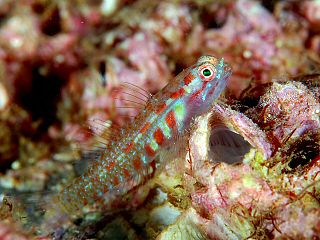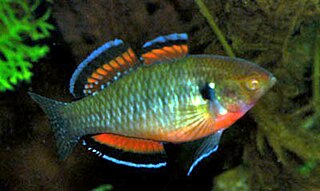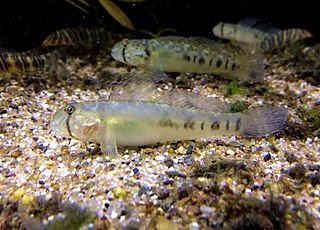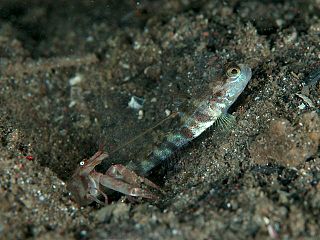
Stiphodon is a genus of freshwater gobies. They inhabit swift, clear streams close to the sea and are found in large parts of Asia and Oceania. Many of the 36 currently recognized species have extremely restricted distributions on single islands or even single streams. These are small gobies with bodies squarish in cross section. A female of Stiphodon multisquamus with a standard length of 60.4mm is the largest Stiphodon individual on record.

Eviota is a genus of fish in the family Gobiidae, commonly as dwarfgobies found in the Indo-Pacific region, where it is distributed from Japan to Australia and from Africa to Pitcairn Island. Species are mainly associated with coral reefs. Many of these fish are short-lived, with life cycles as brief as 3.5 weeks in the tropics. Some species are hermaphrodites and some representatives live symbiotically among the tentacles of the mushroom coral.

Acentrogobius is a genus of gobies native to marine, fresh and brackish waters of the coasts of the Indian Ocean and the western Pacific Ocean.
Glossogobius flavipinnis is a species from the family Gobiidae endemic to Lake Towuti in Sulawesi, Indonesia,> where it is generally found at shallow depths over hard bottoms. This species can reach a length of 8 cm (3.1 in) TL, although in a review of museum specimens the largest male was only 3.9 cm (1.5 in) and the largest female 5.7 cm (2.2 in). It is overall uniform dark with a yellow first dorsal fin. It was previously known under the name Stupidogobius flavipinnis.

Hypseleotris is a genus of fishes in the family Eleotridae. Most are from fresh water in Australia and New Guinea, but species in fresh and brackish water are found around islands in the western Indian Ocean, southern and eastern Africa, southern and eastern Asia, and Pacific islands. The largest species reaches a length of 12 cm (4.7 in). They are sometimes seen in the aquarium trade; especially H. compressa. In Australia they are known as carp gudgeons.

Melanotaenia is a genus of rainbowfish from Australia, Indonesia, New Guinea, and nearby smaller islands.

Mogurnda is a genus of freshwater fishes in the family Eleotridae native to eastern and northern Australia and New Guinea. Several species are endemic to Lake Kutubu in Papua New Guinea.

Mugilogobius is a genus of fish in the family Gobiidae. They are found in fresh, brackish and marine water of the Indo-Pacific region. Several of the freshwater species have highly restricted distributions.

Oligolepis is a genus of fish in the goby family Gobiidae, native to marine, fresh and brackish waters of the coastal areas of the Indian Ocean and the western Pacific Ocean.

Oryzias is a genus of ricefishes native to fresh and brackish water in east and south Asia. Some species are widespread and the Japanese rice fish is commonly used in science as a model organism, while others have very small ranges and are threatened. They are small, up to 8 cm (3.1 in) long, and most are relatively plain in colour.

Oxyeleotris is a genus of sleeper gobies mostly restricted to Australia and New Guinea, though some are found in Southeast Asia.

Sicyopterus is a genus of gobies native fresh waters from Madagascar to the Pacific islands.

Tomiyamichthys is a genus of gobies found from the Red Sea through the Indian Ocean to the western Pacific Ocean.

Cryptocentrus, also known as Watchman gobies, and one of the genera known as shrimp gobies or prawn gobies, is a genus of gobies native to tropical marine waters of the Indian and Pacific oceans.

Myersina is a genus of ray-finned fish from the family Gobiidae, the true gobies which are found from the Atlantic coast of South Africa through the Indian Ocean to the western Pacific Ocean. The generic name honours the American ichthyologist George S. Myers (1905-1985) who was a younger colleague of Herre's at the time at which he described the genus and who went on to be president of the American Society of Ichthyologists and Herpetologists, the head of the Division of Fishes at the United States National Museum and an ichthyologist for the United States Fish and Wildlife Service.

Nesogobius is a genus of goby native to the coastal waters of Australia.
Sueviota is a genus of fish in the family Gobiidae native to the Indian and Pacific Ocean.

Trimma is a genus of fish in the family Gobiidae native to the Indian and Pacific Ocean. Together with members of the genus Eviota, they are known commonly as pygmygobies or dwarfgobies.

Ptereleotris is a genus of dartfishes found in the Atlantic, Indian and Pacific oceans.

















